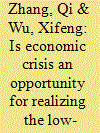|
|
|
Sort Order |
|
|
|
Items / Page
|
|
|
|
|
|
|
| Srl | Item |
| 1 |
ID:
186479


|
|
|
|
|
| Summary/Abstract |
The COVID-19 and the resulting financial crisis have led researchers to focus on the impact of the exogenous shock on the economy and the effectiveness of energy policy for a low-carbon transition. However, measuring this impact sophistically is notoriously fraught with difficulties. In this research, we build a combined agent-based economy–energy model to capture the change in the effectiveness of energy policy in response to an economic crisis. Simulation results show that the government can achieve its low-carbon transition development target using the regulation in the energy market, such as the emissions trading scheme policy. However, this regulation in the energy market will negatively affect the economy, and this adverse effect becomes more severe with either higher energy consumption or a lower energy capacity. Nevertheless, introducing the policy with appropriate timing, typically in the recovery phase of an economic crisis, can effectively reduce the negative impact of government regulation. Finally, some policy implications are proposed for different situations of countries and to reduce the negative effects of energy regulation policy.
|
|
|
|
|
|
|
|
|
|
|
|
|
|
|
|
| 2 |
ID:
168327


|
|
|
|
|
| Summary/Abstract |
We analyse the mid-term macroeconomic challenge to Saudi Arabia of a global low-carbon transition reducing oil revenues, versus the opportunity of national energy reforms. We calibrate a compact, dynamic recursive model of Saudi Arabia on original energy-economy data to explore scenarios. We first assess the consequences of oil prices declining from their levels in the New Policies Scenario (NPS) of the IEA, to their levels in its Sustainable Development Scenario (SDS). By 2030, the Saudi economy loses 1.4 GDP points, 1.6 employment points and USD 504 billion trade surplus accumulation. Its cumulated public deficit rises to 92.8% of GDP. National reforms gradually aligning Saudi energy prices on international prices and inducing structural change of Saudi activity away from energy-intensive industries mitigate these costs if a share of the public income from energy-price deregulation is directed to investment. However, they reduce the cumulated trade surplus and fail to control public deficit accumulation. Sensitivity analysis confirms the capacity of national energy reforms to mitigate the activity cost of global mitigation action, but aggravates the threat of an escalating public deficit. These results underline the importance of broader economic and fiscal reforms as part of the ambitious Vision 2030 Saudi initiative.
|
|
|
|
|
|
|
|
|
|
|
|
|
|
|
|
| 3 |
ID:
176709


|
|
|
|
|
| Summary/Abstract |
Following the Paris Agreement, climate policies have been developing rapidly, consequently affecting all economic agents. To this extent, trade implications and competitiveness effects have been of prime concern to energy and climate policy makers. In this study, we employ the GEM-E3 hybrid CGE model to quantify the regional and sectoral trade impacts of climate mitigation scenarios. In line with the Paris Agreement, we assess a global implementation of NDCs and a global mitigation action consistent with the 2°C target. The scenarios differ in both effort sharing and mitigation stringency, yet we find a reduction of global trade activity under both policy regimes. The key driver is the sharp decline of global demand for fossil fuels. Fossil fuels, a highly traded good, are substituted by domestically produced goods like electricity or by capital equipment that is traded with lower intensity. Decarbonization policies have an important impact on trade flows, affected by the relative stringency of action and the key characteristics of the regional economies. We identify regions that benefit from the emergence of new markets for clean energy goods, contrary to the fossil-fuel exporters, as well as regions that achieve a comparative advantage due to their preparedness from early mitigation action.
|
|
|
|
|
|
|
|
|
|
|
|
|
|
|
|
|
|
|
|
|